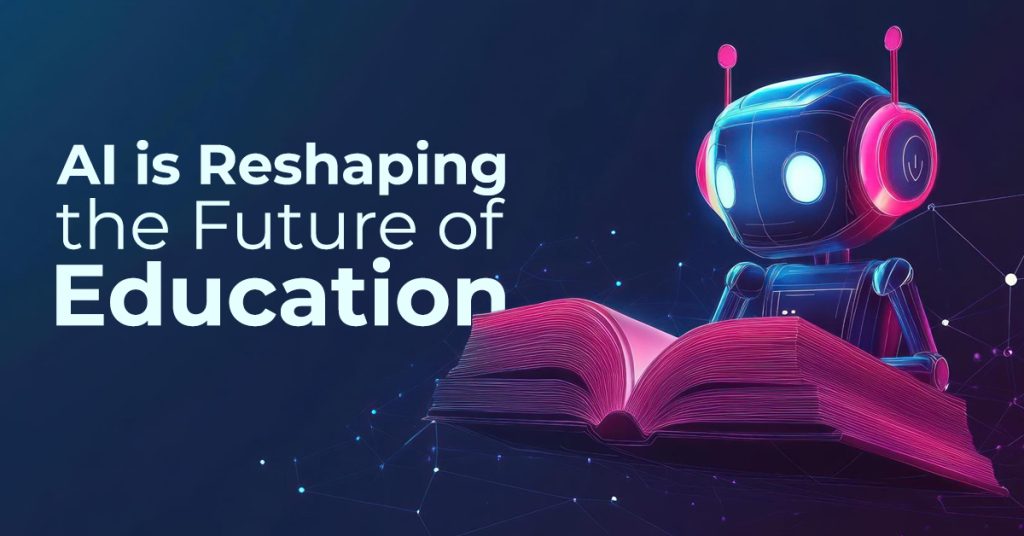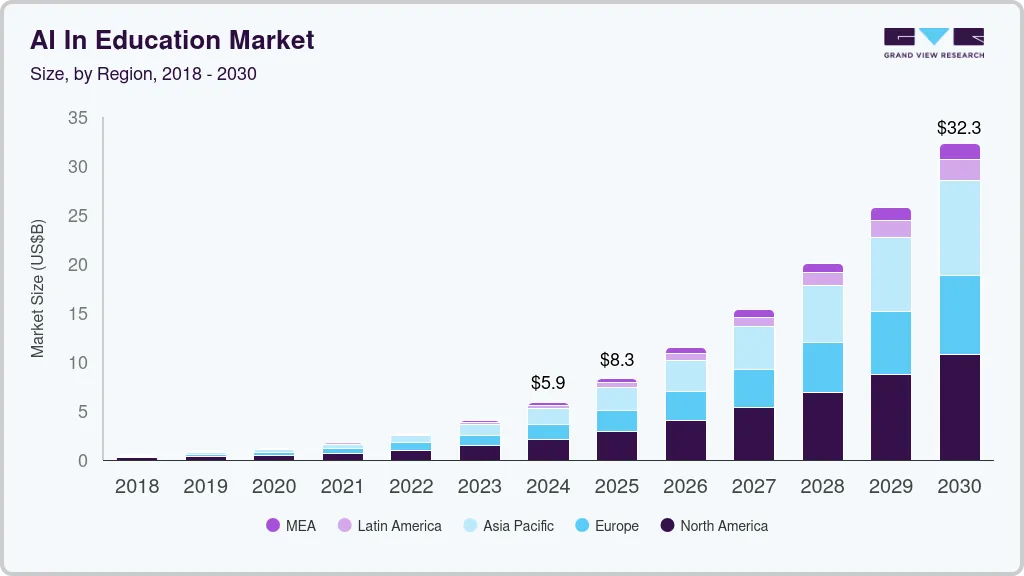11 Ways AI Is Improving Learning and Student Success

AI has become an inseparable part of our lives, from using ChatGPT for our day-to-day chores to leveraging AI-infused services in our cell phones, we’ve been surrounded by AI everywhere.
The education sector has also felt the impact of AI technologies in various forms and has evolved rapidly since then.
As per a report by Grand View Research, the global AI in education market size was estimated at USD 5.88 billion in 2024 and is projected to reach USD 32.27 billion by 2030, growing at a CAGR of 31.2% from 2025 to 2030.
Since these statistics clearly indicate the rapid growth trends of the industry, through this blog, we’ll highlight the benefits of AI in education.

How AI is Reinventing Education
With advanced technologies such as machine learning, data analytics, etc, there for the taking, AI is redefining how the education industry functions with personalised learning experiences, real-time feedback, and valuable insights.
Moreover, it has filled the gap between learning and creativity by encouraging critical thinking and problem-solving skills.
The Future of AI in Education
AI is undoubtedly the future of education, with living ecosystems and real time adaptations as per the learner’s pace and curiosity.
It will bring paradigm shifts in the teaching and learning techniques as teachers will turn mentors while AI will be looking after the assessments, feedback, and knowledge transfer.
Benefits of AI in the Education Industry
Leveraging AI technologies for the education sector comes with enormous benefits, but we’ll be exploring the top benefits of them. Let’s get underway-
1. Personalized Learning
Probably one of the biggest benefits of AI in education is that it offers personalized learning. AI adapts in real time to cater to every individual’s learning needs.
It allows them to strengthen their weak areas by offering tailored courses and exercise recommendations.
2. Smart Content Creation
Through the use of gen AI, it generates content such as assessments, quizzes, and other materials. It reduces time consumption while creating high-quality content that simplifies learning.
The “smart” content is tailored as per the organisational and curriculum goals, allowing educators to focus primarily on imparting knowledge.
3. Administrative Automation
The benefits of AI technology in education have spread beyond classrooms and learning to take up administrative tasks as well. From grading tests, organising research papers to maintaining reports, Artificial Intelligence does it all for you.
By leveraging AI services, you can delegate monotonous and repetitive tasks, saving time and effort as well as minimising errors.
4. Gamified Learning Experiences
The introduction of gamification while learning is also a benefit of AI technology in education. The primary use case of gamification is to make learning fun, engaging, and easy to understand.
These platforms often leverage smart AI algorithms to dynamically evolve as per individual performances and feedback to nurture user-friendly experiences.
5. Data Driven Insights
Another important aspect of how AI helps in education is through data-driven insights. The AI technology helps analyse large chunks of data in minutes to deliver valuable insights.
The educators can analyse the student on multiple metrics such as performance, potential challenges, strong areas, etc with a click of a button.
This helps them conserve time and identify the areas of assistance as well, and they can make the required adjustments or changes in the curriculum while continually imparting quality education.
6. Automated Grading System
The usage of AI in education has facilitated the automation of the grading systems. By using advanced machine learning techniques, AI assesses copies on its own and grades the students accordingly.
It fosters effective workload management for the educators by eliminating monotonous and repetitive tasks, increasing their productivity and quality of education.
7. 24/7 Access
Another benefit of AI in education is that with virtual tutors and chatbots, learning never stops. The learner can learn according to their pace and through their preferred medium.
They can also rewind the previous chapters if they feel so for a clearer understanding. Moreover, these tutors automatically assess the learner’s weak areas, helping them improve.
8. Predictive Analysis
With its predictive analytics tools, AI can identify at-risk students of falling behind academically initially by analysing various factors like assignment completion rates and assessment scores, providing adequate support.
This edtech feature also helps educators to identify potential learning gaps, offer targeted assistance, and build a collaborative and inclusive learning environment.
9. Catering Special Requirements
One of the significant benefits of AI technology in education is that catering to specific requirements of the persons with special needs has become much more convenient.
With its tools such as speech to text and text to speech, AI has brought education within the reach for the children with hearing, visual and cognitive impairments.
This accessibility to learning has opened new ways for them to advance in their careers, achieve new heights and become increasingly self reliant.
10. Multilingual Support
The use of AI in education has significantly eliminated the language barriers, as it can translate the educational content in multiple languages effortlessly.
The learner can access the content in their vernacular language, which has contributed immensely in making learning more flexible and inclusive.
11. Enhanced Professional Development for Teachers
While AI in education has multiple advantages for the students, it’s beneficial for the teachers too. It allows the teachers to continuously iterate and improve themselves.
With its data analytics and machine learning tools, AI fosters all round development for teachers, crucial for adopting latest technologies and teaching methodologies.
Owing to its capabilities of analysing vast data sets, it can provide personalised suggestions to the educators as well as work with them to achieve the goals.
Conclusion
The impact of AI in education is widespread and undeniable, and with more and more institutions turning to leveraging these e-learning services, the education industry also seems to acknowledge the fact.
With benefits such as administrative automation, invaluable data-driven insights, and personalized learning experiences, AI is set to bring groundbreaking revolutions to the education sector.
FAQs
How can AI address teacher burnout?
AI can significantly address the issue of teacher burnout by automating monotonous tasks such as grading, attendance tracking, etc.
What are the long-term impacts of AI in education?
AI in education fosters high-quality and sustainable learning through personalized learning experiences and equips learners with the requisite skills for the automated future.
What ethical challenges does AI in education face?
Some challenges include ensuring data privacy, avoiding algorithmic bias, and maintaining transparency in how AI-driven decisions are made. Institutions must balance innovation with responsible AI use.








 Branded Solutions
Branded Solutions






















